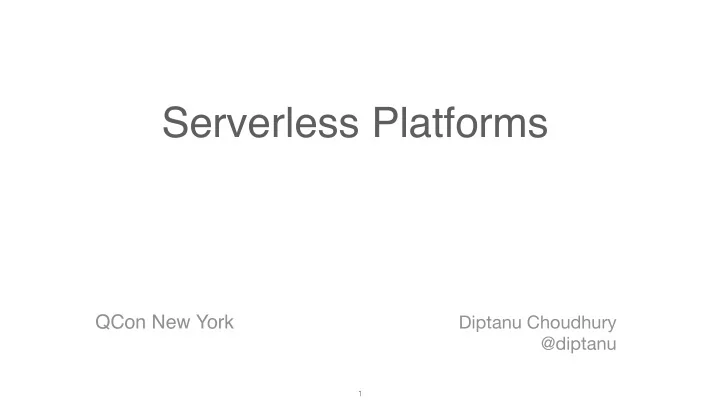

Serverless Platforms Diptanu Choudhury QCon New York @diptanu 1
2
The GOES Mission A lineage of geostationary satellites Current mission is called GOES-R ABI views earth with 16 different spectral bands
GOES-R Products • Atmospheric events • Fire control • Vegetation Monitoring • NASA makes most of the data available to research community
Product Development Workflow 5
Data serving Deployment of Models Iterative Experimentation and in Production and based Model Development Collaboration APIs Image Processing Product Development Workflow 6
Science Engineering • Operates infrastructure to run models • Plans mission objectives • Design systems to scale to petabytes of data and 10s • Develop models and products of 1000s of cores. • Conducts research and drives collaboration • Design real time services for services to consume data • Dev-Infra to improve productivity of researchers The organization 7
Infrastructure • Cluster Schedulers that can scale to 10s of 1000s of cores • Storage services that can scale to petabytes of data • Interactive batch processing systems • Services to stream real time information • APIs to access data from various transformation jobs
Jobs Authorization/ Job Management Authentication Telemetry System System Service Compute Compute Identity Node Node Management Object Store 9
10
Infrastructure Stack of Circa 2017 Applications Batch Identity Microservices Processing Management Object Store LBaaS Tracing Services The Platform Service Telemetry Block Storage Discovery Services Cluster Schedulers Locking and Co-ordination Management
Platforms as a Service Applications Batch Identity Microservices Processing Management Release Management Object Store LBaaS Tracing Services Build Infrastructure Service Telemetry Block Storage Discovery Services Configuration Management Cluster Schedulers Locking and Co-ordination Management
Serverless Architecture 13
Serverless Architecture Application Container Payload Function Application Requests Controller Logic
Serverless Architecture • Incremental evolution over PAAS • Serverless from the perspective of users • Clear separation of concerns between infrastructure engineering and application developers
Serverless Platform • Optimistically concurrent Cluster Scheduler • Application Container • Function Controller • RPC Middleware • Function Invocation shims in data sources • Packaging and distribution service
Cluster Scheduler • Low latency and high throughput scheduling • No head of line blocking • Optimistically concurrent • Scale up to a large number of containers
18
THE PATH TO PRODUCTION FOR A SCHEDULER IS FILLED WITH PAIN CHOOSE AN EXISTING SCHEDULER IF YOU CAN 19
Event Driven Scheduler Evaluations ~= State Change Event
Data Model
External Event Evaluation Creation Evaluation Queuing Evaluation Processing Optimistic Coordination State Updates 22
Templated Jobs • Can be used for low throughput use cases • Expensive to start new processes • Bounded by network operations of scheduler
Variability • Sharing resources • Daemons • Global resources • Maintainance activities • Queuing • Power Limits
Source: Tale at Scale 25
Reduce Variability • Differentiate service classes • Break down long running functions into small ones. • Minimize background activity
Application Containers • Application containers range from language sandboxes to full blown containers • Reduced surface area helps in making the UX better • Application containers have function invocation middleware which are packaged during build
Function Controller • Maintains the network topology of functions • Optimizes for low latency and not cost • Works with the scheduler to scale containers • Works with telemetry system to scale underlying clusters
Software Load Balancer • Service discovery aware LB • Reactive Socket protocol for delivery of request payloads to function containers • Doesn't effect container life cycles • Drops requests which doesn't have any containers associated
Reactive Sockets • RSocket is a means for asynchronous communication between functions and data sources • Messages are multiplexed over a single connection • Flexible interaction models • Provides mechanisms for back pressure and request cancellation
RPC Middleware • RPC implementation moved into the platform • Hedged requests to reduce tail latency • Tied requests to reduce mean and tail latency • Heavy use of back pressure
Cluster Topology • Scheduler chooses the cluster topology for containers • Function Controller can change the topology based on real time latency • Functions which are chained needs to be placed as close as possible
Caching • Various forms of caching • Depends on life cycle management of functions • External caches like Redis, Memcached works best • Hard to use in-memory clustered caches like Groupcache
External Data Sources • Functions can read from external data sources just like traditional applications • Avoid polling external data sources • Data Sources like Kafka could co-operate with functions by a shim which calls functions with data mutations
Build and Distribution • Packaging is part of the server less experience • Packaging pipeline should transform a function to an application container. • Unit Testing should be much easier with Functions than they were for traditional applications • Performance of the platform can be improved by caching containers on compute nodes
Operations in the world of Serverless • Reduced amount of operations for developers • Metrics related to various concerns of the platform should be very targetted.
Application metrics • Latency at the API Gateway level • Throughput of events processed • Latency distribution and planning.
Platform Metrics • Latency of function invocation • Throughput of events dispatched to the platform • Number of active functions
Recommend
More recommend